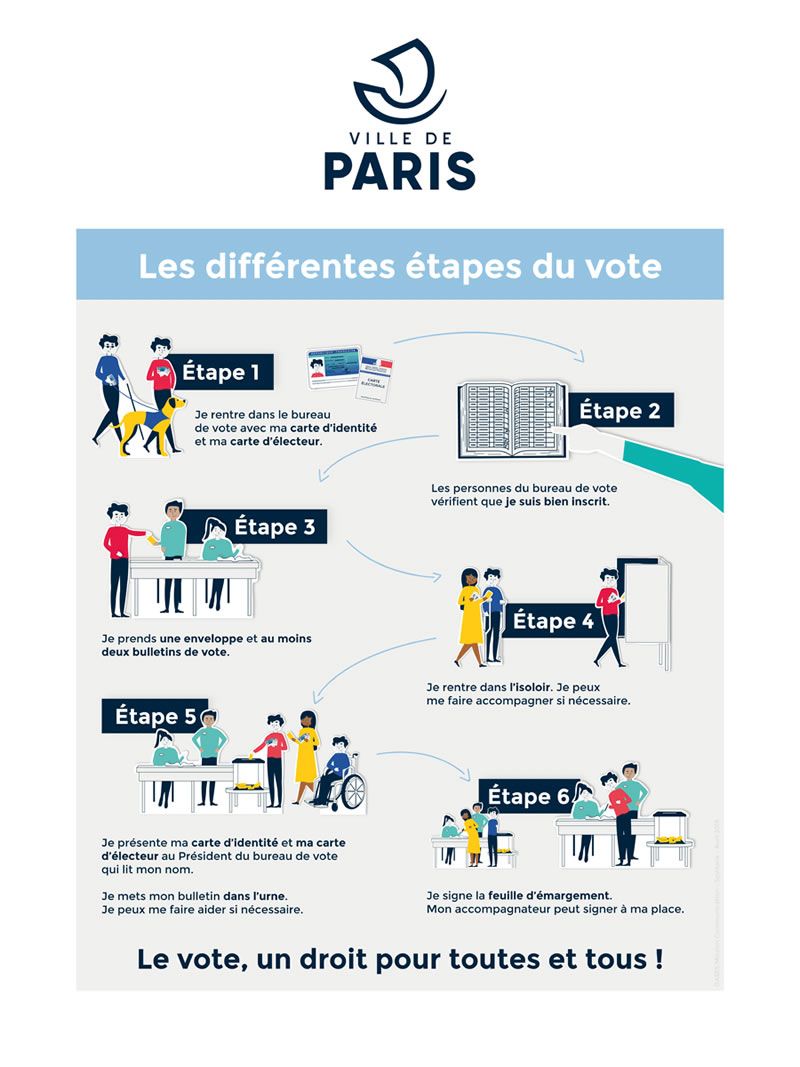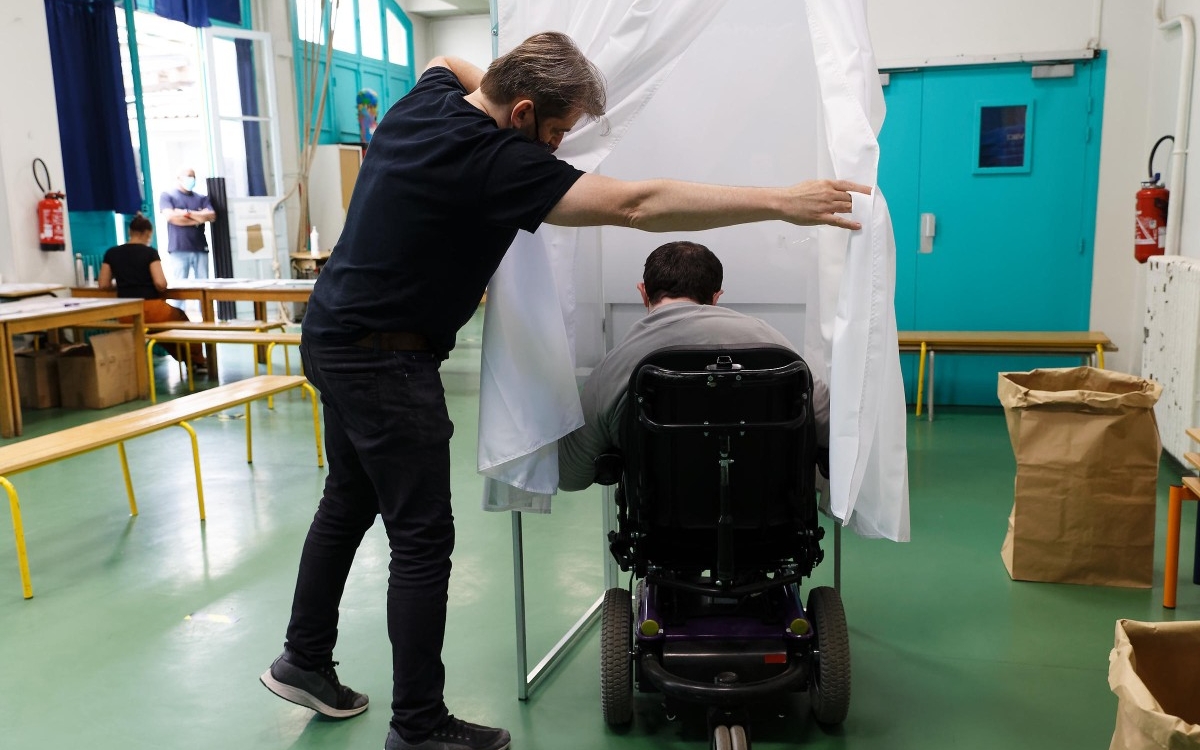Content
Cette page est aussi disponible en français
The City of Paris, in collaboration with the Departmental Council for Citizenship and Autonomy and various volunteer organizations, has established a system aimed at enhancing the accessibility of electoral events for individuals with disabilities.
All Parisian polling stations have been made accessible to all people with disabilities and the elderly since the European elections on May 26, 2019.
This system, the result of six months of work, takes into account people with mental or psychological disabilities, autistic syndrome or intellectual impairment. These measures make it easier for them to exercise their right to vote.
This system, the result of six months of work, takes into account people with mental or psychological disabilities, autistic syndrome or intellectual impairment. These measures make it easier for them to exercise their right to vote.
More accessible voting, regardless of disabilities
Voting presents challenges for certain citizens: those who are illiterate, those with comprehension issues, those who are physically unable to complete certain actions (such as placing the ballot in the box or signing), or those who find it difficult to navigate an unfamiliar setting. For others, the proposed arrangements - in particular, the placing of small Braille cards in front of the stacks of ballot papers - enable them to take part in voting more independently.
Elections accessibility initiatives
Taking things further
To make progress on election accessibility for people with other types of disability, a working group led by the City of Paris was set up in September 2018.
Invited to participate were: Accès Culture, Association des paralysés de France (APF France Handicap), Association de parents d'enfants inadaptés de Paris (APEI 75), Association Valentin Haüy, Casip Cojasor, Centre de ressources Autisme Ile-de-France (CRAIF), Fédération étudiante pour une dynamique études et emploi avec un handicap (FEDEEH), Fédération française de sport adapté (FFSA), Fédération générale des retraités de la fonction publique (FGR-FP) Paris, Fédération syndicale unitaire (FSU), Handéo, Les Papillons blancs de Paris, Nous Aussi, Service d'accompagnement à la vie sociale Didot Accompagnement, Siel Bleu, Union nationale de parents et amis des personnes handicapées mentales (UNAPEI), Union nationale pour l'insertion sociale du déficient auditif (UNISDA) and Union nationale des syndicats autonomes (UNSA).
Invited to participate were: Accès Culture, Association des paralysés de France (APF France Handicap), Association de parents d'enfants inadaptés de Paris (APEI 75), Association Valentin Haüy, Casip Cojasor, Centre de ressources Autisme Ile-de-France (CRAIF), Fédération étudiante pour une dynamique études et emploi avec un handicap (FEDEEH), Fédération française de sport adapté (FFSA), Fédération générale des retraités de la fonction publique (FGR-FP) Paris, Fédération syndicale unitaire (FSU), Handéo, Les Papillons blancs de Paris, Nous Aussi, Service d'accompagnement à la vie sociale Didot Accompagnement, Siel Bleu, Union nationale de parents et amis des personnes handicapées mentales (UNAPEI), Union nationale pour l'insertion sociale du déficient auditif (UNISDA) and Union nationale des syndicats autonomes (UNSA).
The scheme, the result of six months' work in close collaboration with the Paris Conseil départemental de la citoyenneté et de l'autonomie (CDCA), enriched by testimonials from people with intellectual disabilities, was presented by Nicolas Nordman, deputy mayor of Paris responsible for all issues relating to people with disabilities and accessibility, to the Conseil national consultatif des personnes handicapées (CNCPH) on March 13, 2019. It was hailed as helping to make voting more accessible to people with disabilities. In doing so, it is also of use to people with temporary disabilities - for example, in the use of their hands - and the elderly.
The City of Paris was awarded a Prix Territoria for this project in December 2019 ( Civism category).
There are several ways to ensure that elections are accessible
Before the vote
The challenge is to inform people with disabilities about what exists to enable them to exercise their right to vote, and also to inform carers about what they are entitled to do to help them if need be.
-
An initial video explaining the voting process is available on the handicap.paris.fr website.
-
A second video, aimed at polling station staff, is shown to train them in disability awareness.
-
A "kit", consisting of a reminder of the rules to be respected when accompanying users in voting operations and an educational poster written in "easy to read and understand" (FALC), has been sent to the directors of medicosocial establishments and services, who will be able to raise the subject with their residents during workshops.

Voting, a right for everyone
Credit
Ville de Paris
During voting
All Parisian polling stations are accessible to people with disabilities.
-
The buildings housing polling stations are equipped with a permanent or removable access ramp.
-
Each polling booth has a compartment with a lowered shelf.
-
The ballot boxes are placed on a low table, at a height of 80 centimeters, to facilitate the insertion of the ballot paper and the signing of the voting register.
-
The names of candidates or lists appear in Braille on labels placed in front of each stack of ballots.
-
Polling station chairmen and staff are specially trained to welcome people with disabilities.
-
Signs are posted inside the polling station to help you find your way through the voting process (here, you take an envelope and at least two ballot papers; here, you show your ID card, etc.).
-
People with disabilities can be accompanied to the polling station if they are unable to perform certain actions. They can then ask the person of their choice to accompany them during the various stages of the vote:
- in the polling booth, to place the ballot paper in the envelope
- to place the ballot paper in the ballot box
- to sign the register of voters on their behalf, adding the following note: "the voter cannot sign for himself".
This help can be provided by another voter, be it a family member, a friend or someone present at the polling station. People who are not under guardianship may also be assisted by a professional, such as an educator or helper. This professional must be a voter.
Despite the challenge posed by the large number of polling stations in Paris in terms of logistics and harmonization of practices, initial feedback from the European elections has been positive, encouraging the city to continue its efforts to improve accessibility.
We want to hear from you!
Was this information useful to you?
Please note: we cannot reply via this form (please do not include any personal information).
